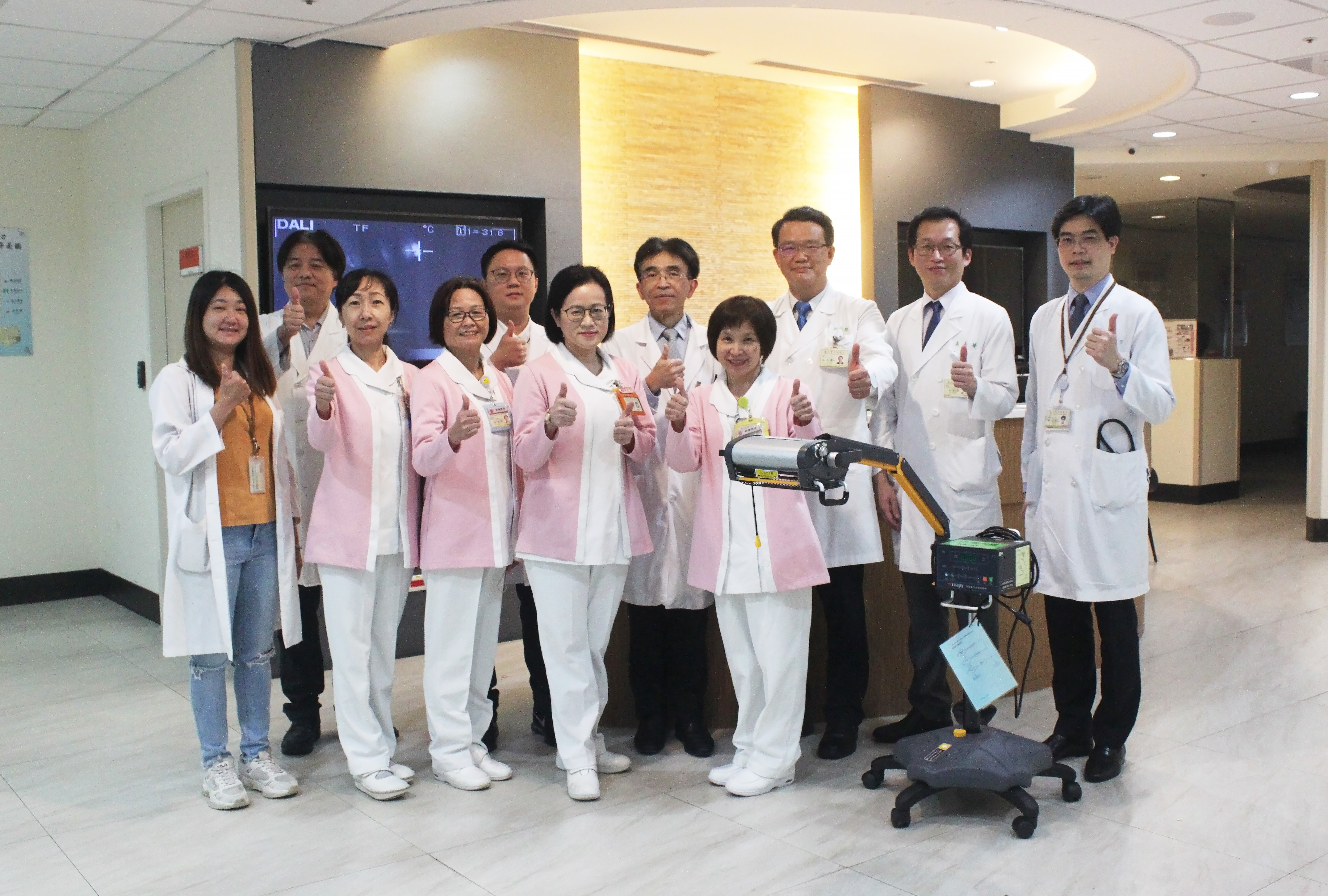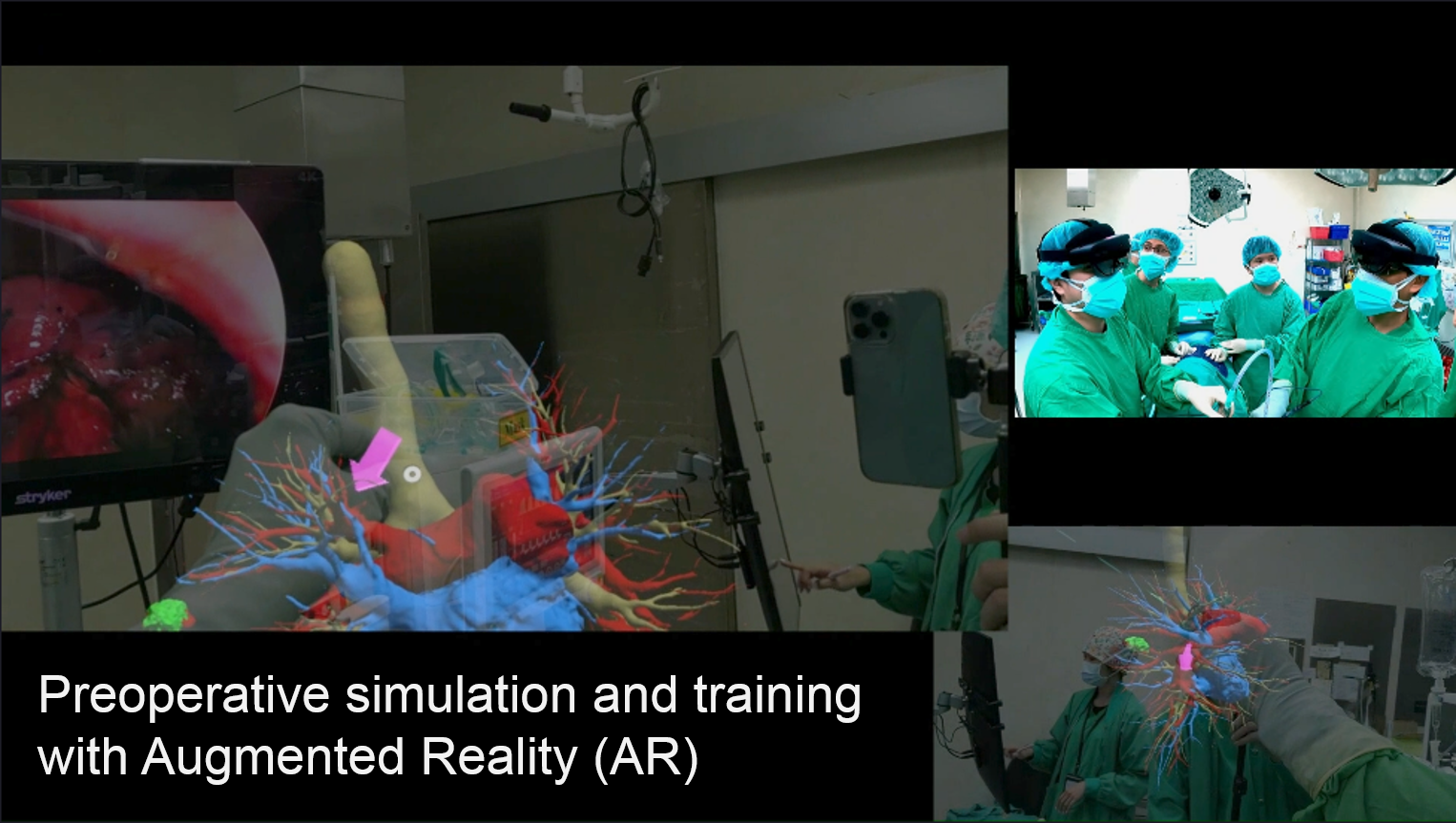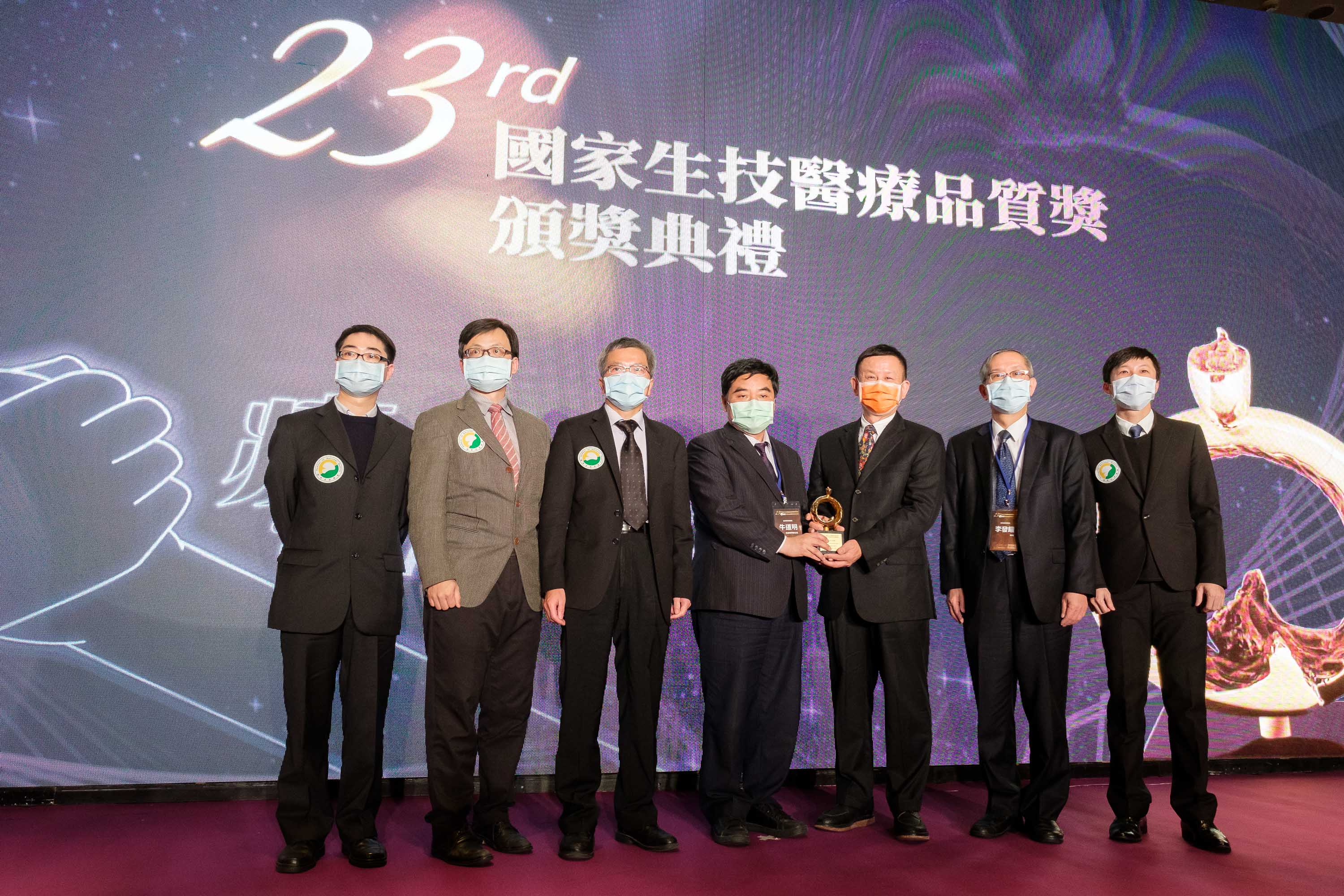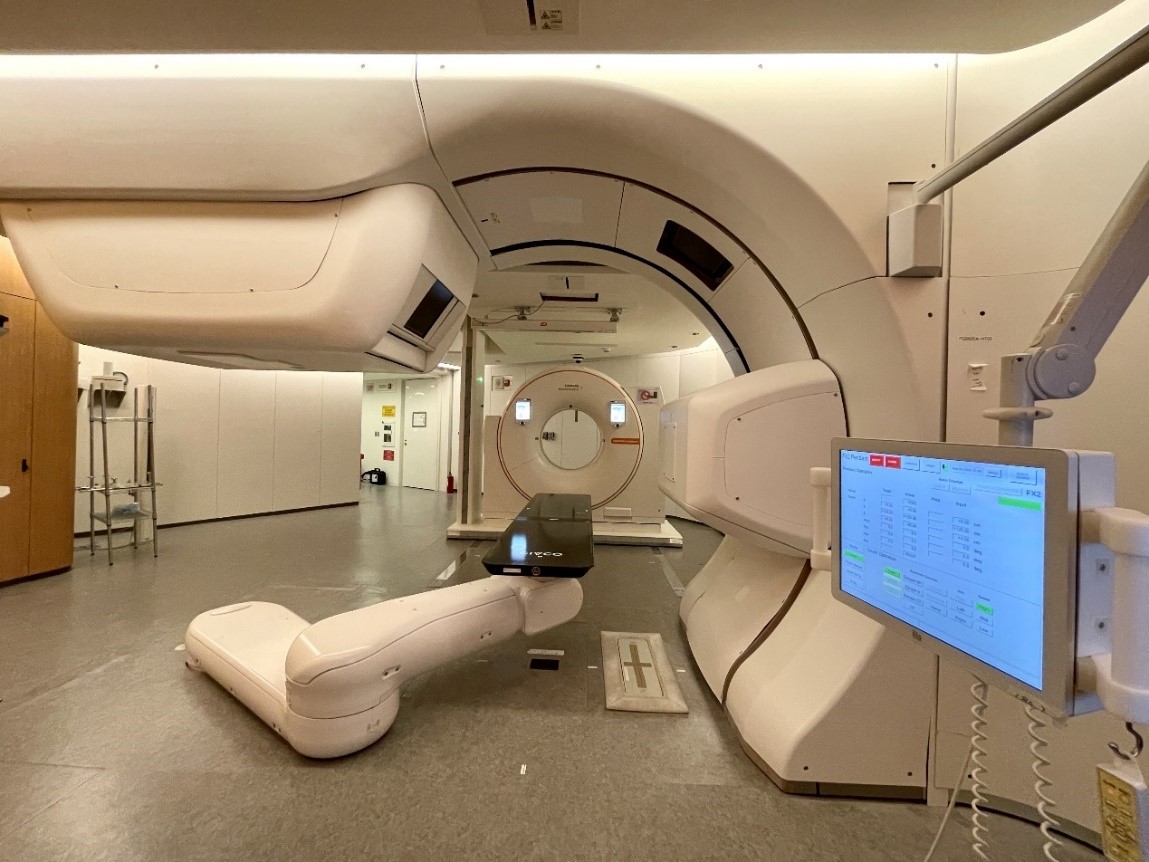
The nephrology team in Taipei Veterans General Hospital pioneered far-infrared therapy for dialysis patients (Photo by Min Chao)
Taipei Veterans General Hospital (TVGH) brings together teams specialising in nephrology, thoracic surgery, genetics, and pancreatic cancer treatment, all of which have previously honoured with the Symbol of Quality (SNQ) Award, to share their achievements in therapeutics, research and innovation.
Far Infrared Therapy Improving Vascular Flow, Driving the Sales of Homegrown Equipment in 23 Countries
In 2004, the nephrology team at TVGH pioneered far-infrared therapy (FIR therapy) to improve fistula patency and blood flow in renal dialysis patients. Led by Dr. Chih-Ching Lin, the Director of Nephrology, and after two decades of relentless research, this FIR therapy was awarded the Silver Medal for Medical Specialty in the SNQ Award 2022. To date, nearly 700 dialysis centres have adopted far-infrared therapy, saving the National Health Insurance (NHI) approximately TWD$421 million annually.
TVGH's FIR therapy has made its mark internationally, having been included in treatment guidelines in Europe and the US since 2019. FIR therapy is now available in 2,000 dialysis centres worldwide, and FIR machines, developed by the Taiwanese company Firapy, are marketed in 23 countries.
In addition, FIT therapy has the potential to address other challenges, such as encapsulating peritoneal sclerosis, diabetic foot ulcers, and occlusive peripheral arterial disease. The nephrology team intends to further expand the scope of FIR applications through continued collaboration with domestic enterprises, offering a lifeline to more patients.
Surgical Simulation Using Augmented Reality (AR) to Precisely Locate Lung Tumours
Lung cancer stands as the leading cause of cancer-related deaths in Taiwan, but public awareness of lung cancer and lung nodules has been raised in recent years thanks to low-dose computed tomography (LDCT) screening. Although lung nodules can be removed by minimally invasive surgery, it relies on surgical navigation technology to increase accuracy, minimise invasiveness, and reduce postoperative pain.
TVGH’s thoracic surgery team has thus introduced a one-stop solution to streamline the process of surgical navigation, which in the past required patients to be CT-scanned in one room before travelling to another for surgery. The solution, which won the Bronze Medal for Medical Specialty in the SNQ Award 2022, allows surgeons to target the lesion and perform the surgery simultaneously in the operating room, using a mixed approach of conventional CT, mobile CT and an electromagnetic (EM) surgical navigation system. More than 95% of lung cancers were treated at TVGH with thoracoscopy, and in this cohort, 96% of tumours removed were confirmed to be malignant. This suggests that patients were receiving the surgery they needed rather than unnecessary treatment.

Thoracic surgery using MS HoloLens for preoperative simulation and training(Photo by TVGH)
The thoracic surgery team has partnered with Microsoft to adopt the HoloLens that allows surgeons to view a patient’s CT scan images in detail whilst donning augmented reality (AR) glasses. The AR technology and gadget visualise lung tumours or nodules using colours to indicate blood vessels and bones, empowering surgeons with a crystal-clear visual representation for preoperative simulation and training.
World’s First Real-Time Whole Genome Sequencing Analysis of Gene Mutation Found in Rare Disease
Dr. Dau-Ming Niu, Director of the Department of Paediatrics at TVGH, led a team that discovered Taiwan which has the highest prevalence of Fabry disease, an inherited genetic disorder, in the world. Through genetic testing, the team identified over 2,000 cases with Fabry disease gene mutations, amassing the world's largest repository of samples. They also established the first rare disease medical research center in Asia to offer treatment.
TVGH’s achievements in Fabry disease are unrivalled worldwide, earning them the Gold Medal for Medical Quality in 2022, further cementing their world-leading status in this field.

Dr. Dau-Ming Niu (center) and the team leading in Fabry disease (Photo by RBMP)
To accelerate the development of precision medicine, TVGH has created the "Magic Bison", the world's first real-time whole genome sequencing (WGS) analysis system that has an intuitive user interface and provides analysis in 10 seconds. Magic Bison generates reports in seven major categories, including disease diagnosis, variants interpretation by the American College of Medical Genetics and Genomics (ACMG), genetic predisposition, drug metabolism, proactive screening, carrier status, and human leukocyte antigen typing (HLA typing).
Magic Bison incorporates over 30 years of expertise in variant filtering and prioritisation to deliver the most accurate analysis results. In over 85.6% of samples, the pathogenic gene variant is prioritised first and in over 92.93% of samples, the pathogenic gene variant is found in the top three positions. It also provides AI-assisted risk analysis for complex diseases, serving multiple purposes ranging from health promotion to evaluation of treatment options.
AI-assisted Oral Reconstruction
The Department of Dentistry at TVGH has developed an in-house digital workflow for tooth and tissue reconstruction, utilizing computer-aided design/computer-aided manufacture (CAD-CAM) technology to design and create virtual bone movements, dental implant surgery, and denture design, to rebuild the tissues of the mouth.
In terms of diagnosis, the TVGH team applies MRI to develop AI-assisted tool for temporomandibular disorders (TMD). Added to TVGH’s technological approach is a minimally invasive surgery that inserts 3D-printed bone plates to reconstruct facial structures. The team also have pioneered the way into dental implants and rapid denture repair.
The pursuit of excellence does not stop quite there. The team reached out to National Yang Ming Chiao Tung University's College of Dentistry for co-development in 3D printing materials that have been classified as medical device. Their 3D-printed denture was cleared as class II medical device by FDA, following the US and Netherland, becoming the third country in the world that markets such product in 14 markets.
Minimally Invasive Surgery and Heavy Particle Therapy Treating Pancreatic Cancer
Pancreatic cancer is dreaded due to its difficulty to detect in the early stages, coupled with yet another challenge for surgery as its proximity to major blood vessels and other organs. Despite the complexity of treating pancreatic cancer, the Heavy Ion Therapy Center at TVGH has rich experience gained from over 1,900 cases of the Whipple procedures (pancreaticoduodenectomy), including more than 590 completed by the Da Vinci Surgical Robotic system.
TVGH’s Heavy Ion Therapy Center officially operated in May 2023, and it was found a remarkable success in battling pancreatic cancer with treatment combined with heavy particle therapy, chemotherapy and surgery. The center has two operational chambers, providing medical service for foreign patients.

The Heavy Ion Therapy Center in operation since May 2023 (Photo by TVGH)
TVGH to Launch the Boron Neutron Capture Therapy Center
But TVGH reckons a missing piece to be found for patients with head-and-neck or brain cancers that are easy to relapse and typically fail to respond to routine therapy. To address this, the hospital is now planning a launch the Boron Neutron Capture Therapy (BNCT) Center to fill the gap.
TVGH’s partnership with National Tsing Hua University plants the seed on a BNCT site residing at the hospital. Located in Hsinchu, a city is about a one-and-a-half-hour drive from Taipei, the University operates the Tsing Hua Open Pool Reactor (THOR) that has been converted for use in BNCT. Currently, some patients must travel to the university for boron neutron capture therapy and then head back to TVGH in Taipei for follow-up visits. Being part of TVGH facilities, the BNCT Center in planning will allow convenience and holistic patient care.
Over the past 10 years, both parties had co-established a BNCT workflow, in which 300 patients were treated, and a group of clinicians were trained. TVGH is now consulting supplies of medical equipment and systems upon where the treatment rooms shall be placed and what requirements for construction shall be met. With the Heavy Ion Therapy Center in operation and the Boron Neutron Capture Therapy Center in development, TVGH is poised to offer patients more treatment options.
B2B Opportunities with Taipei Veterans General Hospital
AI in Healthcare
| Products/Solutions | Partnership wanted |
|---|---|
| AI-assisted diagnosis of temporomandibular disorders | Product development & distribution |
Digital Health
| Products/Solutions | Partnership wanted |
|---|---|
| Surgical simulation using AR to precisely locate lung tumours | Preoperative simulation & training |
| AI-assisted oral reconstruction- tooth and tissues | Software implementation for dental clinic |
Precision Medicine
| Products/Solutions | Partnership wanted |
|---|---|
| "Magic Bison", the world's first real-time whole genome sequencing (WGS) analysis system | Product distribution; genetic testing & analysis |
Innovative R&D
| Products/Solutions | Partnership wanted |
|---|---|
| 3D-printed denture (class II) by TVGH and National Yang Ming Chiao Tung University | Product distribution |
New and About
| Products/Solutions | Partnership wanted |
|---|---|
| Heavy particle therapy treating pancreatic cancer | International medical services |
| Far infrared therapy for encapsulating peritoneal sclerosis, diabetic foot ulcers, and occlusive peripheral arterial disease | FIR therapy study & application |
Taipei Veterans General Hospital at Healthcare+ Expo 2023
- Thursday, 30 November to Sunday, 3 December
- Booth No. M601a | 4F, TaiNEX 1
